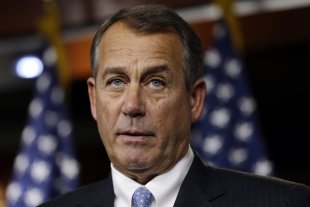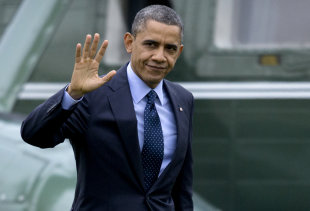ATMEH, Syria (AP) — A baby boy joined the ranks of Syria’s tens of thousands of war wounded when a missile fired by Bashar Assad‘s air force slammed into his family home and shrapnel pierced his skull.
Four-month-old Fahed Darwish suffered brain damage and, like thousands of others seriously hurt in the civil war, he will likely need care well after the fighting is over. That’s something doctors say a post-conflict Syria won’t be able to provide.
Making things worse, there has been a sharp spike in serious injuries since the summer, when the regime began bombing rebel-held areas from the air, and doctors say a majority of the wounded they now treat are civilians.
This week, Fahed was recovering from brain surgery in an intensive care unit, his head bandaged and his body under a heavy blanket, watched over by Mariam, his distraught 22-year-old mother.
She said that after her first-born is discharged from the hospital in Atmeh, a village in an area of relative safety near the Turkish border, they will have to return to their village in a war zone in central Syria.
“We have nowhere else to go,” she said.
Even for those who have escaped direct injury, the civil war is posing a mounting health threat. Half the country’s 88 public hospitals and nearly 200 clinics have been damaged or destroyed, the World Health Organization says, leaving many without access to health care. Diabetics can’t find insulin, kidney patients can’t reach dialysis centers. Towns are running out of water-purifying materials. Many of the hundreds of thousands displaced by the fighting are exposed to the cold in tents or unheated public buildings.
“You are talking about a public health crisis on a grand scale,” said Dr. Abdalmajid Katranji, a hand and wrist surgeon from Lansing, Michigan, who regularly volunteers in Syria.
No one knows just how many people have been injured since the uprising against Assad erupted in March 2011, starting out with peaceful protests that turned into an armed insurgency in response to a violent government crackdown.
More than 43,000 have been killed in the past 21 months, said Rami Abdul-Rahman, head of the Britain-based Syrian Observatory for Human Rights, basing his count on names and details provided by activists in Syria. He said the number of wounded is so large he can only give a rough estimate, of more than 150,000.
Casualties began to rise dramatically at the start of the summer. At the time, the regime, its ground troops stretched thin, began bombing from the air to prevent opposition fighters from gaining more territory.
Seemingly random bombings have razed entire villages and neighborhoods, driving terrified civilians from their homes, with an estimated 3 million Syrians out of the country’s population of 23 million now displaced.
About 10 percent of the wounded suffer serious injuries and many of those will need long-term care and rehabilitation, said Dr. Omar Aswad of the Union of Syrian Medical Relief Organizations, an umbrella for 14 aid groups.
This includes artificial limbs and follow-up surgery. “This is of course not available and will be one of the major (health) problems in the months right after the war,” said Mago Tarzian, emergency director for the Paris-based Doctors Without Borders.
For now, aid groups are struggling to provide even emergency treatment in under-equipped clinics.
The two dozen small hospitals and field clinics in rebel-run areas of Idlib province in the north only have a few Intensive Care Unit beds between them, said Aswad. None has a CT scanner, an important diagnostic tool.
“We need generators, we need medical supplies and the most pressing is medicine,” he said.
The challenge has been compounded by new types of injuries.
The regime has begun dropping incendiary bombs that can cause severe burns, according to the New York-based Human Rights Watch, citing amateur video and witness accounts.
Ole Solvang, a researcher for the group, said he saw remnants of such a bomb on a recent Syria trip. Aswad said doctors in Idlib and nearby Aleppo province reported seeing patients with burns from such weapons.
Doctors and hospitals have also been targeted. Aswad, who fled the city of Idlib in March after regime forces entered it, said five friends in a secret association of anti-regime physicians have been arrested. Hospitals, ambulances and doctors have been attacked, Solvang said, calling it “a worrying trend that makes the medical situation even worse.”
One of the bright spots is a 50-bed emergency care clinic set up six weeks ago in a former elementary school in Atmeh.
Largely funded by a wealthy Syrian expatriate, the Orient clinic, with five ICU beds, handles some of the most serious cases in a radius of some 150 kilometers (90 miles), said its director, orthopedic surgeon Abdel Hamid Dabbak.
In the past, seriously wounded patients had to go to Turkey, risking dangerous delays at the border, he said. Now, once patients are stabilized in Atmeh, they are sent to a sister clinic across the border for follow-up care.
In Orient’s ICU, a 24-year-old rebel fighter was breathing oxygen through a mask. He had been brought in a day earlier, bleeding heavily from stomach wounds and close to death, said Dr. Maen Martini, a volunteer physician from Joliet, Illinois. After surgery, he stabilized and was taken off a respirator. A delayed crossing into Turkey would have killed him, Martini said.
The fighter’s neighbor was little Fahed, whose house had been struck by a missile on Saturday in the village of Kafr Zeita in Hama province. “The roof collapsed on us,” his mother said of the attack. “We ran out … I saw him bleeding from his head, but it was just a small cut.”
The local clinic said the injury was more serious than it seemed and the family rushed to Atmeh, more than 100 kilometers (60 miles) to the north.
Since surgery, Fahed has been nursing and has moved his arms and legs, and the doctor is hoping for a near-complete recovery.
“Clinically, he has improved dramatically,” he said.
Middle East News Headlines – Yahoo! News
Title Post: Wounded presage health crisis for postwar Syria
Rating:
100%
based on 99998 ratings.
5 user reviews.
Author: Fluser SeoLink
Thanks for visiting the blog, If any criticism and suggestions please leave a comment












